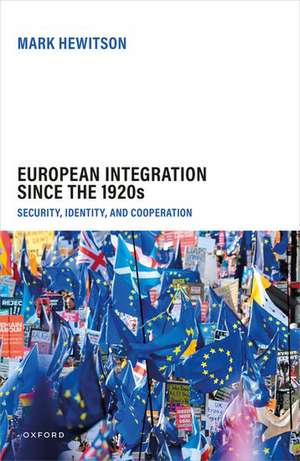European Integration Since the 1920s: Security, Identity, and Cooperation
Autor Mark Hewitsonen Limba Engleză Hardback – 14 noi 2024
Preț: 859.15 lei
Preț vechi: 1228.66 lei
-30% Nou
Puncte Express: 1289
Preț estimativ în valută:
164.40€ • 175.80$ • 137.07£
164.40€ • 175.80$ • 137.07£
Carte disponibilă
Livrare economică 17-24 martie
Preluare comenzi: 021 569.72.76
Specificații
ISBN-13: 9780198915942
ISBN-10: 0198915942
Pagini: 544
Dimensiuni: 165 x 240 x 34 mm
Greutate: 1.04 kg
Editura: OUP OXFORD
Colecția OUP Oxford
Locul publicării:Oxford, United Kingdom
ISBN-10: 0198915942
Pagini: 544
Dimensiuni: 165 x 240 x 34 mm
Greutate: 1.04 kg
Editura: OUP OXFORD
Colecția OUP Oxford
Locul publicării:Oxford, United Kingdom
Notă biografică
Mark Hewitson is Professor of German History and Politics at UCL, where he was appointed in 1998. His interests lie principally in the intellectual, cultural and political history of nineteenth- and twentieth-century Germany and Europe. He is currently working on projects about nationalism and national identity, experiences and representations of modern warfare, and conceptions of Europe and the West during the nineteenth and twentieth centuries. He is also interested in various aspects of historical theory, including the relationship between history and other social sciences.
